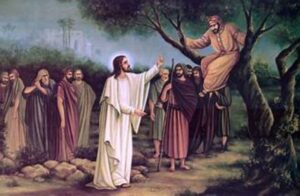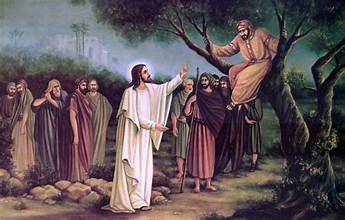Luke 19:1-48 King James Bible KJV

The Parable of the Ten Minas, The Story of Zacchaeus, Jesus Cleanses the Temple, Jesus Weeps Over Jerusalem, Jesus’ Triumphal Entry into Jerusalem
Luke 19:1-48 King James Bible KJV. Luke Chapter 19 presents several key events and teachings of Jesus, focusing on themes such as salvation, the responsibility of believers to live faithfully in anticipation of His return, and the coming of God’s kingdom and call to recognize and respond to God’s presence and offer of grace. The chapter includes the story of Zacchaeus, the Parable of the Ten Minas, and Jesus’ triumphant entry into Jerusalem where He is welcomed as King but also faces rejection by the religious authorities.
- Salvation for the Lost: The story of Zacchaeus shows that Jesus’ mission is to seek and save those who are lost. Salvation comes to those who respond with faith and repentance, no matter their past.
- Faithfulness in Stewardship: The Parable of the Ten Minas teaches the importance of using the gifts and opportunities God gives us. Faithfulness is rewarded, while negligence leads to judgment.
- Jesus as the Messianic King: Jesus’ triumphal entry into Jerusalem declares His kingship, fulfilling prophecy and revealing Him as the Prince of Peace.
- Compassion and Judgment: Jesus’ weeping over Jerusalem shows His deep compassion for those who reject Him, but it also highlights the reality of judgment for those who fail to recognize God’s offer of salvation.
- Purity in Worship: The cleansing of the temple reminds believers of the importance of reverence and purity in approaching God.
Luke 19:1-48 King James Bible KJV
—————-

The Story of Zacchaeus – verses 1–10
Zacchaeus, a wealthy chief tax collector in Jericho, wants to see Jesus but is short in stature, so he climbs a sycamore tree to get a better view. When Jesus passes by, He calls Zacchaeus down and announces that He will stay at Zacchaeus’ house. This surprises the crowd because Zacchaeus is considered a sinner due to his profession as a tax collector. During the meal, Zacchaeus declares his repentance, offering to give half his wealth to the poor and repay four times what he may have defrauded others. Jesus then declares that salvation has come to Zacchaeus’ house, for he, too, is a “son of Abraham,” and He states His mission: “For the Son of Man came to seek and to save the lost.”
- Jesus Seeks the Lost: Zacchaeus represents those who are spiritually lost and marginalized in society. His story illustrates that Jesus actively seeks out and welcomes sinners, offering them redemption and transformation.
- Repentance and Restitution: Zacchaeus’ response to Jesus shows true repentance. His willingness to make restitution and give to the poor demonstrates the change in his heart and his desire to live righteously.
- Salvation is for All: By calling Zacchaeus a “son of Abraham,” Jesus emphasizes that salvation is available to everyone, even those society rejects, as long as they turn to God with faith and repentance.
The Parable of the Ten Minas – verses 11–27
As Jesus approaches Jerusalem, people believe that the kingdom of God will soon appear. Jesus tells them a parable about a nobleman who goes to a distant country to receive a kingdom and then return. Before leaving, he gives ten of his servants one mina each and tells them to engage in business until he returns. Upon his return, he asks for an account of how they managed the money. One servant makes ten minas from one, and another makes five. The nobleman rewards them according to their faithfulness. However, one servant hides the mina, fearing the nobleman, and returns it without gain. The nobleman reprimands him, takes the mina, and gives it to the one who made ten. The parable ends with a judgment on those who rejected the nobleman’s rule.
- Faithfulness with What We Are Given: The parable highlights the importance of being faithful with the gifts and responsibilities God entrusts to us. Those who use their talents, resources, and opportunities wisely are rewarded.
- Judgment for Negligence: The servant who failed to use his mina represents those who neglect their responsibilities in God’s kingdom. Fear and inactivity lead to judgment.
- The Coming Kingdom: The nobleman represents Jesus, who will return to establish His kingdom. The parable teaches that there will be a time of accountability when Jesus returns, and His followers must be prepared by being diligent and faithful in their work for the kingdom.


Jesus’ Triumphal Entry into Jerusalem – verses 28–40
As Jesus approaches Jerusalem, He sends two disciples to fetch a colt, which has never been ridden, for Him to ride into the city. The disciples place their cloaks on the colt, and as Jesus rides, people spread their cloaks on the road and shout praises, saying, “Blessed is the king who comes in the name of the Lord! Peace in heaven and glory in the highest!” The Pharisees tell Jesus to rebuke His disciples for their loud praise, but Jesus responds, “I tell you, if they keep quiet, the stones will cry out.”
- Jesus as the Messiah: Jesus’ entry into Jerusalem on a colt fulfills Old Testament prophecy (Zechariah 9:9), signifying that He is the promised Messiah and King. The people’s acclamation shows their recognition of Him as the one who brings peace and salvation.
- The King of Peace: Jesus enters Jerusalem not on a war horse but on a humble colt, symbolizing that His kingdom is one of peace, not violence.
- Inevitable Praise: Jesus’ response to the Pharisees suggests that His kingship and the glory of God cannot be suppressed. Even if people were silent, creation itself would testify to His lordship.

Jesus Weeps Over Jerusalem – verses 41–44
As Jesus approaches Jerusalem, He weeps over the city, foreseeing its destruction. He laments that Jerusalem does not recognize “the things that make for peace” and the visitation of God. Jesus predicts that the city will be surrounded by enemies, torn down, and its people devastated because they failed to recognize God’s presence and the opportunity for salvation.
- Jesus’ Compassion and Sorrow: Jesus’ weeping over Jerusalem reflects His deep compassion for the people and His sorrow over their spiritual blindness. Despite their rejection of Him, Jesus longs for their salvation.
- The Consequences of Rejecting Jesus: Jesus foresees the destruction of Jerusalem, which this destruction is a consequence of the people’s rejection of Him as the Messiah, and their failure to embrace His message of peace and salvation.
- The Importance of Recognizing God’s Visitation: The passage emphasizes the need to recognize and respond to God’s presence and offer of salvation when it is given. Missing this opportunity leads to dire consequences.


Jesus Cleanses the Temple – verses 45–48
Upon entering Jerusalem, Jesus goes to the temple and drives out those who are selling things there, saying, “It is written, ‘My house will be a house of prayer’; but you have made it a den of robbers.” Afterward, Jesus teaches daily in the temple, but the religious leaders seek to kill Him, though they cannot find a way because the people are captivated by His teaching.
- Purity of Worship: Jesus’ cleansing of the temple underscores the importance of reverence and purity in worship. The temple was meant to be a place of prayer and communion with God, but it had been turned into a marketplace.
- Jesus’ Authority: By cleansing the temple, Jesus asserts His authority as the Messiah and His zeal for true worship. He confronts the corruption and hypocrisy of the religious leaders.
- Opposition to Jesus: The religious leaders, threatened by Jesus’ popularity and authority, seek to kill Him. Their opposition foreshadows the events leading to His crucifixion.

Luke 19:1-48 King James Bible KJV
1 And Jesus entered and passed through Jericho.
2 And, behold, there was a man named Zaccaeus, which was the chief among the publicans, and he was rich.
3 And he sought to see Jesus who he was; and could not for the press, because he was little of stature.
4 And he ran before, and climbed up into a sycomore tree to see him: for he was to pass that way.
5 And when Jesus came to the place, he looked up, and saw him, and said unto him, Zacchæus, make haste, and come down; for to day I must abide at thy house.
6 And he made haste, and came down, and received him joyfully.
7 And when they saw it, they all murmured, saying, That he was gone to be guest with a man that is a sinner.
8 And Zacchaeus stood, and said unto the Lord; Behold, Lord, the half of my goods I give to the poor; and if I have taken any thing from any man by false accusation, I restore him fourfold.
9 And Jesus said unto him, This day is salvation come to this house, forsomuch as he also is a son of Abraham.
10 For the Son of man is come to seek and to save that which was lost.

11 And as they heard these things, he added and spake a parable, because he was nigh to Jerusalem, and because they thought that the kingdom of God should immediately appear.
12 He said therefore, A certain nobleman went into a far country to receive for himself a kingdom, and to return.
13 And he called his ten servants, and delivered them ten pounds, and said unto them, Occupy till I come.
14 But his citizens hated him, and sent a message after him, saying, We will not have this man to reign over us.
15 And it came to pass, that when he was returned, having received the kingdom, then he commanded these servants to be called unto him, to whom he had given the money, that he might know how much every man had gained by trading.
16 Then came the first, saying, Lord, thy pound hath gained ten pounds.
17 And he said unto him, Well, thou good servant: because thou hast been faithful in a very little, have thou authority over ten cities.
18 And the second came, saying, Lord, thy pound hath gained five pounds.
19 And he said likewise to him, Be thou also over five cities.
20 And another came, saying, Lord, behold, here is thy pound, which I have kept laid up in a napkin:
21 For I feared thee, because thou art an austere man: thou takest up that thou layedst not down, and reapest that thou didst not sow.
22 And he saith unto him, Out of thine own mouth will I judge thee, thou wicked servant. Thou knewest that I was an austere man, taking up that I laid not down, and reaping that I did not sow:
23 Wherefore then gavest not thou my money into the bank, that at my coming I might have required mine own with usury?
24 And he said unto them that stood by, Take from him the pound, and give it to him that hath ten pounds.
25 (And they said unto him, Lord, he hath ten pounds.)
26 For I say unto you, That unto every one which hath shall be given; and from him that hath not, even that he hath shall be taken away from him.
27 But those mine enemies, which would not that I should reign over them, bring hither, and slay them before me.

28 And when he had thus spoken, he went before, ascending up to Jerusalem.
29 And it came to pass, when he was come nigh to Bethphage and Bethany, at the mount called the mount of Olives, he sent two of his disciples,
30 Saying, Go ye into the village over against you; in the which at your entering ye shall find a colt tied, whereon yet never man sat: loose him, and bring him hither.
31 And if any man ask you, Why do ye loose him? thus shall ye say unto him, Because the Lord hath need of him.
32 And they that were sent went their way, and found even as he had said unto them.
33 And as they were loosing the colt, the owners thereof said unto them, Why loose ye the colt?
34 And they said, The Lord hath need of him.
35 And they brought him to Jesus: and they cast their garments upon the colt, and they set Jesus thereon.
36 And as he went, they spread their clothes in the way.
37 And when he was come nigh, even now at the descent of the mount of Olives, the whole multitude of the disciples began to rejoice and praise God with a loud voice for all the mighty works that they had seen;
38 Saying, Blessed be the King that cometh in the name of the Lord: peace in heaven, and glory in the highest.
39 And some of the Pharisees from among the multitude said unto him, Master, rebuke thy disciples.
40 And he answered and said unto them, I tell you that, if these should hold their peace, the stones would immediately cry out.

41 And when he was come near, he beheld the city, and wept over it,
42 Saying, If thou hadst known, even thou, at least in this thy day, the things which belong unto thy peace! but now they are hid from thine eyes.
43 For the days shall come upon thee, that thine enemies shall cast a trench about thee, and compass thee round, and keep thee in on every side,
44 And shall lay thee even with the ground, and thy children within thee; and they shall not leave in thee one stone upon another; because thou knewest not the time of thy visitation.

45 And he went into the temple, and began to cast out them that sold therein, and them that bought;
46 Saying unto them, It is written, My house is the house of prayer: but ye have made it a den of thieves.
47 And he taught daily in the temple. But the chief priests and the scribes and the chief of the people sought to destroy him,
48 And could not find what they might do: for all the people were very attentive to hear him.
You must be logged in to post a comment.